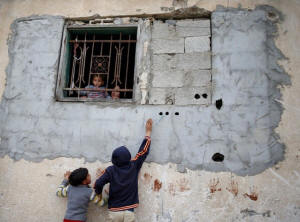|
An economy in ruins leaves Gazans with
hard choices
 Send a link to a friend
Send a link to a friend
 [February 28, 2018]
By Nidal al-Mughrabi [February 28, 2018]
By Nidal al-Mughrabi
GAZA (Reuters) - The man who makes crisps,
chocolate and vanilla snacks for Gaza had just finished explaining how
his business was going through the worst economic crisis of his life
when the lights went out, shutting down his factory. Again.
Wael Al-Wadiya has been running his food manufacturing business since
1985 – in a Gaza Strip that was very different from the one in which he
and two million other Palestinians now live.
Back then Israeli settlers were still in Gaza, the Islamist militant
group Hamas did not yet exist, and Palestinians were still two years
away from the first of the uprisings against Israeli military occupation
that introduced the word ‘Intifada’ to the world.
Sitting in a slowly declining industrial estate near the fortified
border with Israel, the 51-year-old confectioner says that Gaza has been
brought to a near-standstill by a decade of Israeli-led blockades, and
internal Palestinian divisions.
"The situation is very miserable. People's ability to buy has fallen to
a minimum, therefore our businesses and businesses in Gaza are suffering
as never before," said Wadiya.

He has cut production by 70 percent and wages by 30 percent. Employees
who used to work each day now may work one day in three. "Unless a
miracle happens, factories and companies will close down and it will be
the real death of the economy," he said.
There has long been poverty in Gaza, but with unemployment now at 43.6
percent, according to the Palestinian Bureau of Statistics, even
once-wealthy merchants are defaulting on debts, causing other businesses
to collapse, like dominoes.
Many in Gaza blame Israel for the hardships, accusing it of placing an
economic blockade on the enclave that has drastically reduced the
movement of people and goods.
But Gazans also fault their own leaders, complaining of a power struggle
between Hamas, the armed group that seized military power in Gaza in
2007, and Fatah, the secular party of Western-backed Palestinian
President Mahmoud Abbas.
Both Hamas and Fatah levy taxes. Both run competing bureaucracies. And
even electricity has become a tool of political power - until recently
the blackouts that plagued Wadiya’s factory were exacerbated by Abbas
cutting money for Israeli current for Gaza.
Fatah says Hamas exploits money it collects from electricity consumers
for its own purposes.
Israel, which pulled its settlers and soldiers out of Gaza in 2005, says
it has been forced to control access to and from the territory to stop
Hamas sending out gunmen and bombers, and from smuggling in weapons or
material to make them.

The Israeli military says that it carries out "constant calculated risk
management" between allowing humanitarian aid through to Gazans, while
contending with Hamas, which "attempts to exploit the aid intended for
Gaza’s civilian residents”.
POVERTY AND SECURITY
A combination of war, isolation, and internal rivalries has left Gaza in
its current state.
[to top of second column]
|

Palestinian children play as a girl held by her mother looks out of
the window of house in the northern Gaza Strip February 12, 2018.
Picture taken February 12, 2018. REUTERS/Mohammed Salem

Last year Abbas cut the salaries of 60,000 government employees in
Gaza by 30 per cent, leaving them with little to spend in shops and
markets after paying off bank loans. The sums of bounced checks in
Gaza nearly doubled from $37 million to $62 million between 2015 and
2016, and then again to $112 million in 2017, according to the
Palestinian Monetary Authority.
This lack of buying power contributed to a drop in imports through
the one remaining commercial crossing with Israel, with just 350
truckloads per day compared with 800 in the last quarter of 2017.
Some merchants took a religious initiative in December in which they
offered to write off customers' debts using the hashtag 'Sameh
Toajar' - 'Forgive, and Be rewarded (by God).'
It was supported by Hamas and other factions, but the scale of the
debts was too great for such a small-scale remedy.
"Gaza has gone into clinical death and is in need of root solutions,
real and sustainable, and not temporary or short-lived solutions,"
said Maher al-Tabba, a Gaza economist.
At the other end of the economic scale from the merchants are
Suhaib, Shadi and Ahmed al-Waloud, who scavenge through garbage near
their home in northern Gaza searching for plastic to sell to
recycling plants.
Their father was one of the Gazans who lost their jobs in Israel
more than a decade ago when Israel closed the door to thousands of
Palestinian workers following Hamas's seizure of control.

"I have been used to doing this job since I was a child," said
Suhaib, 19, from Beit Lahiya. But they now earn just enough to "stay
alive," he said, because the price paid for second-hand plastic has
fallen by 80 per cent. "Nowadays there is not much work. People are
not throwing away a lot of plastic."
The question that dominates Gaza is whether hard times will make
Palestinians more inclined to support attacks on Israel, or less so,
because they fear reprisals.
Ali al-Hayek, the chairman of the Palestinian Businessmen
Association in Gaza, said that total collapse of the economy would
lead to instability that would be in nobody’s interests.
"Gaza is living through a real humanitarian crisis," he said. "An
economic collapse will lead to a security collapse that will cause
trouble for the international community and for Israel."
(Reporting by Nidal al-Mughrabi Writing by Stephen Farrell, Editing
by William Maclean)
[© 2018 Thomson Reuters. All rights
reserved.]
Copyright 2018 Reuters. All rights reserved. This material may not be published,
broadcast, rewritten or redistributed.
Thompson Reuters is solely responsible for this content. |